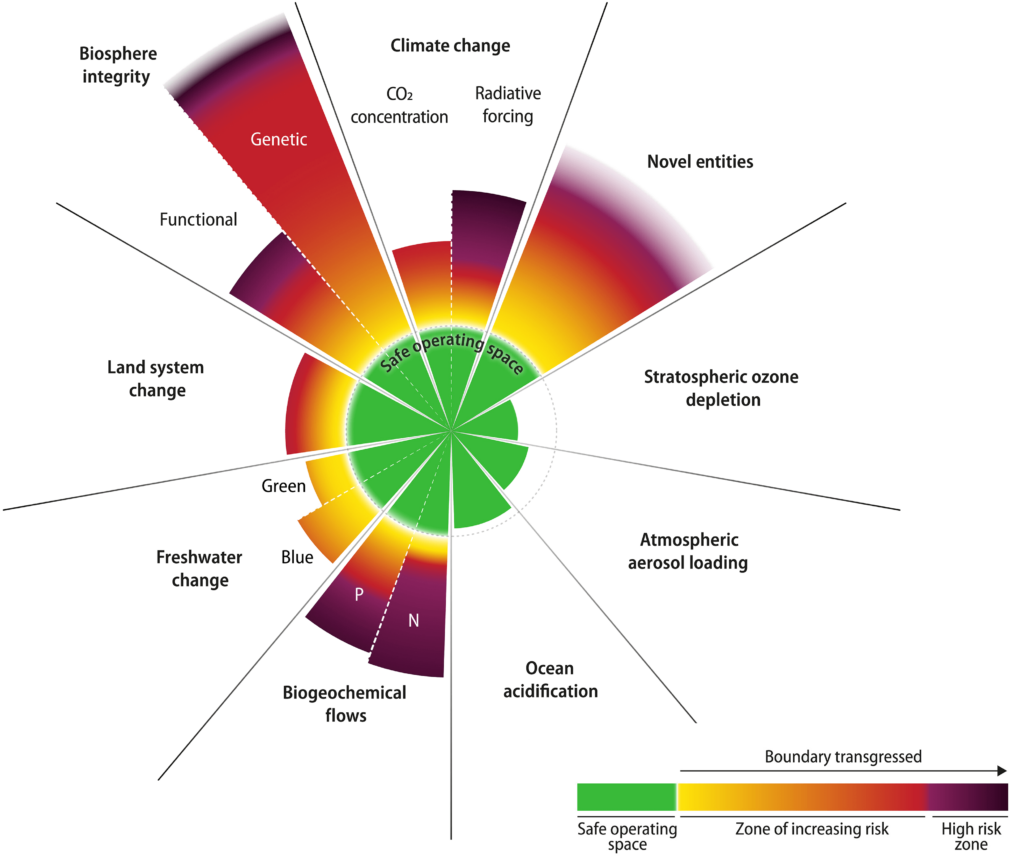The Human Impact on Earth’s Health Reaches Critical Levels – Urgent Action Needed
19th September 2023

19th September 2023

This article was originally posted on climateneturalgroup.com
Humanity’s actions are pushing the Earth beyond its limits, posing a severe threat to our planet’s stability, according to a recent study published in the scientific journal Science Advances. This study serves as a comprehensive “health check” for the planet, assessing its well-being across various environmental indicators.
The researchers draw upon the concept of “planetary boundaries,” which were first introduced in 2009. These boundaries encompass nine critical environmental factors, including global warming, biodiversity loss, nitrogen and phosphorus cycles, ozone layer depletion, ocean acidification, water scarcity, land use, chemical pollution, and atmospheric particle levels. As long as human activities remain within these boundaries, the Earth can naturally manage the associated challenges, and the ecosystem remains relatively stable. However, when these boundaries are exceeded, the equilibrium that has sustained life on Earth for millennia becomes increasingly precarious.
The current state of the planet, as described by the study, is alarming. Of the nine planetary boundaries, only three remain unbreached. The Earth’s climate has been significantly disrupted, biodiversity loss has exceeded acceptable levels, and chemical pollution and deforestation are rampant. Only ocean acidification remains within the safe boundary, along with air pollution and ozone layer depletion, although even these are approaching their limits.

One of the key figures in the study, Johan Rockström, director of the Institute for Climate Impact Research in Potsdam (PIK), emphasises the critical importance of restoring forests to their early 20th-century levels. This action could enable these forests to absorb the excessive CO2 emissions currently exacerbating global warming. Additionally, the researchers advocate for a renewed focus on declining biodiversity, emphasising its fundamental role in maintaining essential cycles like carbon and water.
Detlef van Vuuren, a professor specialising in global environmental change at the University of Utrecht and the Netherlands Environmental Assessment Agency, describes the study as alarming. He points out that we are currently grappling with multiple environmental crises concurrently, with climate change being one of the most prominent. The recent surge in extreme weather events underscores the urgency of the situation. The study echoes the landmark work of the Club of Rome in the 1970s, which warned about the consequences of placing too much stress on the Earth’s capacity to cope with pollution and waste. However, global environmental pressure has continued to increase since then.
Despite the dire situation outlined in the study, there is still room for hope and action. Van Vuuren suggests that we need to explore pathways to stay within the planetary boundaries. He highlights the wealth of knowledge available on climate change, emphasising the need for societal changes, such as reduced energy consumption, a shift to alternative energy sources, and reforms in transportation, industry, and agriculture. Although these changes will require time, some optimistic scenarios suggest that they could be globally achieved by 2050.
The scientist concludes on an optimistic note, noting that while the Earth is unwell, it is not beyond healing. He believes that a combination of technological advancements and changes in human behavior can significantly mitigate the environmental challenges we face. Encouraging people to consume less and adopt more sustainable diets can have a profound positive impact.
In summary, the recent study highlights the precarious state of the Earth due to humanity’s disregard for planetary boundaries. Urgent action is required to restore the planet’s health and maintain the stability that has allowed human civilization to flourish for thousands of years. While the situation is alarming, there is hope that with the right strategies and collective efforts, we can reverse the damage and secure a sustainable future for generations to come.
Anthesis are climate change experts. Our Nature and Biodiversity leaders are specialists in developing solutions for institutions and organisations seeking to mitigate their negative impacts on the environment.
EXPLORE OUR NATURE-RELATED SERVICES
Furthermore, our Carbon Project Development team is working on carbon removal projects, which restore nature and biodiversity and are frontrunners on regenerative agriculture in South Africa and South America.